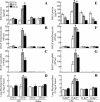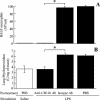Distinct roles of pattern recognition receptors CD14 and Toll-like receptor 4 in acute lung injury
- PMID: 15731076
- PMCID: PMC1064978
- DOI: 10.1128/IAI.73.3.1754-1763.2005
Distinct roles of pattern recognition receptors CD14 and Toll-like receptor 4 in acute lung injury
Erratum in
-
Correction for Jeyaseelan et al., "Distinct Roles of Pattern Recognition Receptors CD14 and Toll-Like Receptor 4 in Acute Lung Injury".Infect Immun. 2022 Apr 21;90(4):e0001422. doi: 10.1128/iai.00014-22. Epub 2022 Mar 14. Infect Immun. 2022. PMID: 35285245 Free PMC article. No abstract available.
Abstract
Acute lung injury (ALI) induced by lipopolysaccharide (LPS) is a major cause of mortality among humans. ALI is characterized by microvascular protein leakage, neutrophil influx, and expression of proinflammatory mediators, followed by severe lung damage. LPS binding to its receptors is the crucial step in the causation of these multistep events. LPS binding and signaling involves CD14 and Toll-like receptor 4 (TLR4). However, the relative contributions of CD14 and TLR4 in the induction of ALI and their therapeutic potentials are not clear in vivo. Therefore, the aim of the present study was to compare the roles of CD14 and TLR4 in LPS-induced ALI to determine which of these molecules is the more critical target for attenuating ALI in a mouse model. Our results show that CD14 and TLR4 are necessary for low-dose (300-microg/ml) LPS-induced microvascular leakage, NF-kappaB activation, neutrophil influx, cytokine and chemokine (KC, macrophage inflammatory protein 2, tumor necrosis factor alpha, interleukin-6) expression, and subsequent lung damage. On the other hand, when a 10-fold-higher dose of LPS (3 mg/ml) was used, these responses were only partially dependent on CD14 and they were totally dependent on TLR4. The CD14-independent LPS response was dependent on CD11b. A TLR4 blocking antibody abolished microvascular leakage, neutrophil accumulation, cytokine responses, and lung pathology with a low dose of LPS but only attenuated the responses with a high dose of LPS. These data are the first to demonstrate that LPS-induced CD14-dependent and -independent (CD11b-dependent) signaling pathways in the lung are entirely dependent on TLR4 and that blocking TLR4 might be beneficial in lung diseases caused by LPS from gram-negative pathogens.
Figures








Similar articles
-
Type 1 fimbriae deliver an LPS- and TLR4-dependent activation signal to CD14-negative cells.Mol Microbiol. 2001 Feb;39(3):542-52. doi: 10.1046/j.1365-2958.2001.02205.x. Mol Microbiol. 2001. PMID: 11169097
-
Lipopolysaccharide-induced leukocyte-endothelial cell interactions: a role for CD14 versus toll-like receptor 4 within microvessels.J Immunol. 2002 Aug 15;169(4):2111-9. doi: 10.4049/jimmunol.169.4.2111. J Immunol. 2002. PMID: 12165539
-
Induction of TNF-alpha and MnSOD by endotoxin: role of membrane CD14 and Toll-like receptor-4.Am J Physiol Cell Physiol. 2001 Jun;280(6):C1422-30. doi: 10.1152/ajpcell.2001.280.6.C1422. Am J Physiol Cell Physiol. 2001. PMID: 11350737
-
Porphyromonas gingivalis lipopolysaccharide signaling in gingival fibroblasts-CD14 and Toll-like receptors.Crit Rev Oral Biol Med. 2002;13(2):132-42. doi: 10.1177/154411130201300204. Crit Rev Oral Biol Med. 2002. PMID: 12097356 Review.
-
CD14 and toll-like receptor 4: a link between infection and acute coronary events?Heart. 2004 Sep;90(9):983-8. doi: 10.1136/hrt.2002.001297. Heart. 2004. PMID: 15310678 Free PMC article. Review.
Cited by
-
Effect of Toll-like receptor 4 inhibitor on LPS-induced lung injury.Inflamm Res. 2010 Oct;59(10):837-45. doi: 10.1007/s00011-010-0195-3. Epub 2010 Apr 13. Inflamm Res. 2010. PMID: 20387088
-
Spiraea prunifolia var. simpliciflora Attenuates Oxidative Stress and Inflammatory Responses in a Murine Model of Lipopolysaccharide-Induced Acute Lung Injury and TNF-α-Stimulated NCI-H292 Cells.Antioxidants (Basel). 2020 Feb 26;9(3):198. doi: 10.3390/antiox9030198. Antioxidants (Basel). 2020. PMID: 32111036 Free PMC article.
-
Both TRIF- and MyD88-dependent signaling contribute to host defense against pulmonary Klebsiella infection.J Immunol. 2009 Nov 15;183(10):6629-38. doi: 10.4049/jimmunol.0901033. Epub 2009 Oct 21. J Immunol. 2009. PMID: 19846873 Free PMC article.
-
Small interference RNA targeting TLR4 gene effectively attenuates pulmonary inflammation in a rat model.J Biomed Biotechnol. 2012;2012:406435. doi: 10.1155/2012/406435. Epub 2012 Feb 6. J Biomed Biotechnol. 2012. PMID: 22496605 Free PMC article.
-
Soluble CD14 Enhances the Response of Periodontal Ligament Stem Cells to P. gingivalis Lipopolysaccharide.PLoS One. 2016 Aug 9;11(8):e0160848. doi: 10.1371/journal.pone.0160848. eCollection 2016. PLoS One. 2016. PMID: 27504628 Free PMC article.
References
-
- Akashi, S., S. Saitoh, Y. Wakabayashi, T. Kikuchi, N. Takamura, Y. Nagai, Y. Kusumoto, K. Fukase, S. Kusumoto, Y. Adachi, A. Kosugi, and K. Miyake. 2003. Lipopolysaccharide interaction with cell surface Toll-like receptor 4-MD-2: higher affinity than that with MD-2 or CD14. J. Exp. Med. 198:1035-1042. - PMC - PubMed
-
- Akashi, S., R. Shimazu, H. Ogata, Y. Nagai, K. Takeda, M. Kimoto, and K. Miyake. 2000. Cutting edge: cell surface expression and lipopolysaccharide signaling via the Toll-like receptor 4-MD-2 complex on mouse peritoneal macrophages. J. Immunol. 164:3471-3475. - PubMed
-
- Andonegui, G., S. M. Goyert, and P. Kubes. 2002. Lipopolysaccharide-induced leukocyte-endothelial cell interactions: a role for CD14 versus Toll-like receptor 4 within microvessels. J. Immunol. 169:2111-2119. - PubMed
-
- Barsness, K. A., J. Arcaroli, A. H. Harken, E. Abraham, A. Banerjee, L. Reznikov, and R. C. McIntyre, Jr. 2004. Hemorrhage-induced acute lung injury is TLR-4 dependent. Am. J. Physiol. Regul. Integr. Comp. Physiol. 87:R592-R599. - PubMed
-
- Bernard, G. R., A. Artigas, K. L. Brigham, J. Carlet, K. Falke, L. Hudson, M. Lamy, J. R. Legall, A. Morris, and R. Spragg. 1994. The American-European Consensus Conference on ARDS: definitions, mechanisms, relevant outcomes, and clinical trial coordination. Am. J. Respir. Crit. Care Med. 149:818-824. - PubMed
Publication types
MeSH terms
Substances
Grants and funding
LinkOut - more resources
Full Text Sources
Other Literature Sources
Molecular Biology Databases
Research Materials

